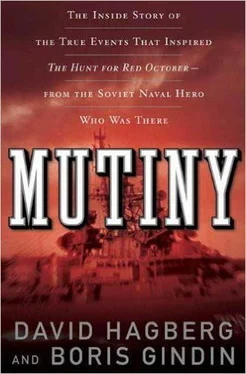But the KGB never takes its victims to the hospital. Once they enter the execution room, their next trip will be to an unmarked grave, and just about every Russian knows it. That includes Sablin and his coconspirators.
PART 8
THE HUNT FOR FFG STOROZHEVOY

The thunder spread through the chain of command like shock waves left behind a jet passing overhead at the speed of sound. Fleet Admiral Sergei Gorshkov and his wife had gone out to their dacha about fifty kilometers northeast of Moscow, not too far from Star City, to spend a relaxing holiday with a few friends. He didn’t drink much alcohol, unless it was required of him during state affairs. In fact, most of the time he preferred water from fresh coconuts, which he sipped through a straw.
Nevertheless, he stays up until nearly three in the morning, talking and laughing with his friends, before he finally goes to bed, after another long, exhausting day. Perhaps he is finally beginning to think about retirement. He’d been promoted to fleet admiral in 1956 by Nikita Khrushchev and personally seen to the modernization of the entire Soviet navy, which was no mean feat considering the kind of money the Americans were throwing around on their nuclear submarines and aircraft carriers.
On this chilly November morning even all his experience as a naval officer does not prepare him for what he will face in the coming hours when his aide, Senior Lieutenant Yevgenni Markin, scurries down the hall, taps lightly on Gorshkov’s door, and enters his bedroom.
The admiral opens his eyes, instantly awake despite the fact he’s only had one hour of sleep. He’s always imagined that the global thermonuclear war they’ve dreaded since 1945 would begin this way: a frightened aide coming to his commander with news that a nuclear missile attack had been launched against the Soviet Union.
“Da, what is it?” the admiral asks, softly so as not to disturb his wife sleeping next to him.
“No one is sure, Admiral,” Markin whispers. “But it’s possible that a mutiny may be in progress aboard one of our ships in the Baltic Fleet.”
Gorshkov sits up in bed, and by the time he tosses the covers aside and gets to his feet Markin is there with his robe and slippers.
“Would you like tea?”
“Yes,” the admiral says, and he marches out of his bedroom, down a long corridor, through a glassed-in unheated porch to his office at the back of the house. During the day it looks down a wooded slope to a small stream from which he has pulled some trout in happier times.
Mutiny. Not in his navy!
He switches on the desk light and telephones Naval Headquarters. The duty officer, a young lieutenant, answers on the first ring.
“What’s going on?” Gorshkov demands. He doesn’t bother to identify himself. It’s up to his people to recognize his voice.
The lieutenant is obviously flustered, but it is to his credit that he maintains his composure. He’s reporting directly now to arguably the third most important man in the Soviet Union behind Party General Secretary Leonid Brezhnev and Minister of Defense Andrei Grechko.
“Admiral, from what I have been able to piece together so far, a mutiny may be in progress aboard the antisubmarine vessel Storozhevoy. Apparently the zampolit enlisted the aid of several officers and a portion of the enlisted crew, arrested the captain, took over the ship, and left their parade formation mooring in Riga.”
Gorshkov closes his eyes for just a moment. This is every commanders worst nightmare. An organization, any organization, depends on an adherence to a chain of command. When that breaks down, only chaos can result. And when the breakdown occurs within a military unit, a heavily armed military unit, the chaos can turn deadly unless it is stopped.
Markin is there, unobtrusively, with a glass of tea in a filigreed silver holder, which he places on the desk at the admiral’s hand. The lieutenant lights a cigarette from a box on the desk and perches it delicately on the edge of a lage marble ashtray, a gift from the president of North Korea. Then Markin leaves, softly closing the door.
“How does this information come to us?” the admiral asks. “Tell me everything.” He will have to brief Grechko and Brezhnev, but first he needs answers.
“We’re not entirely certain that all the data is accurate, Admiral, but we’re told that a senior lieutenant from the Storozhevoy jumped ship around twenty-four hundred hours and reported to the captain of an Alpha submarine that his zampolit had mutinied.”
“Where is that officer at this moment?”
“The KGB has him in Riga.”
“What about the submarine captain?”
“He’s still aboard his boat, I think,” the duty officer says, though he’s obviously not sure. “Shall I have him arrested?”
“Not yet,” Gorshkov says. “What happened next?”
“The officer was taken ashore, where he told his story to the officer on duty, who in turn reported to the the port security people of Brigade Seventy-eight. It took a half hour for the officer’s report to be confirmed before the harbormaster was informed.”
Gorshkov closes his eyes for a second. “God in heaven,” he mutters. Was the system so bad that it created stupid men who were slow and made stupid decisions? Or were the men so bad that they had created the system? But he knew that every navy was the same, to one degree or another.
“Continue.”
“The harbormaster apparently telephoned the Riga KGB Rezident, who sent a man down to the dock to interview the officer, and to make sure that this wasn’t a hoax. Maybe the officer was drunk, or had gone samovolka.”
Brezhnev would need to be impressed, but Minister of Defense Grechko would want all the facts.
“How long did this take?”
“From what I gather, about one hour from the time the KGB Rezident was—”
“What was the upshot of his investigation?”
“Whether or not the officer was telling the truth is yet to be determined, but it has been confirmed that the Storozhevoy sailed without orders and in the process collided with his mooring buoy and very nearly succeeded in running down a gasoline tanker.”
“Then what?”
“The ship is presumably still sailing north toward the gulf—”
“How did this come to headquarters, Lieutenant?”
“From Lubyanka, sir,” the duty officer says. “The Riga KGB Rezident telephoned his boss here in Moscow, who in turn telephoned us.”
Gorshkov is about to compliment the lieutenant for acting so quickly, but the duty officer isn’t finished.
“Naturally I didn’t want to disturb the admiral with hearsay, so I conducted my own investigation.”
“Which took one hour?”
“No, sir. Forty-five minutes. And then I made the call.”
“The Storozhevoy’s crew has mutinied and the ship is gone?”
“Yes, sir,” the young duty officer says.
Once again Gorshkov closes his eyes for a second. He wants to laugh, but he cannot. If the crew of a Soviet warship has mutinied, men will die.
“Listen to me, Lieutenant, and listen very carefully,” Gorshkov says.
“Sir.”
“First, I want a reconnaissance aircraft sent to locate the Storozhevoy. When the ship has been found, no action is to be taken against him, but I must be personally informed. Immediately. Not one hour later.”
“Yes, sir.”
“I want the captains of every ship and boat at anchor in Riga to be awakened and ordered to prepare to get under way within the hour on my orders.”
Читать дальше













